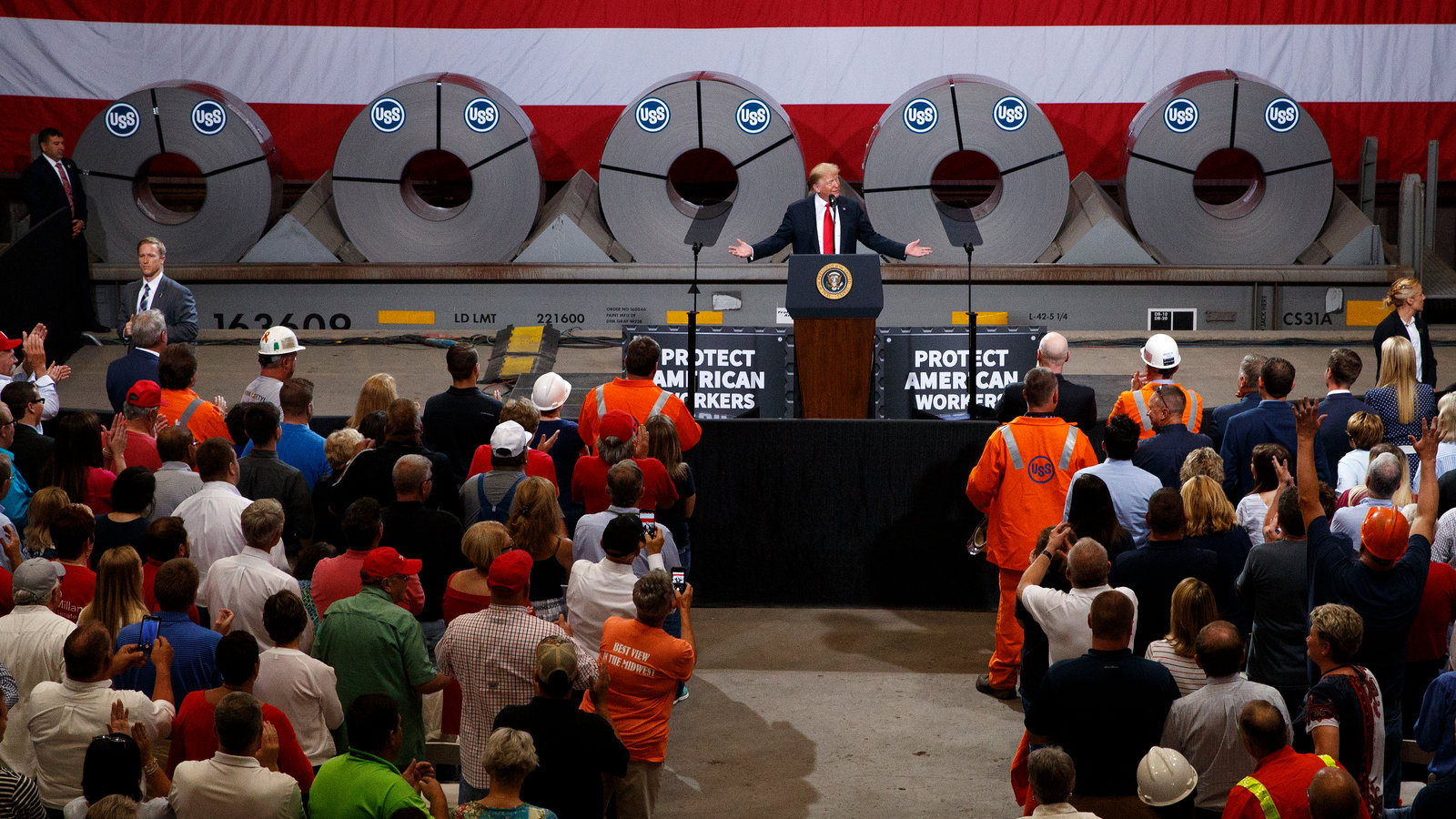Could Tariffs Replace Income Taxes? Examining Trump's Claim

Table of Contents
The Economic Theory Behind Tariffs and Income Taxes
Understanding the core differences between tariffs and income taxes is crucial to evaluating Trump's proposal. Tariffs are taxes imposed on imported goods, primarily aimed at protecting domestic industries from foreign competition – a protectionist measure. Their impact is largely felt through increased prices for consumers and altered trade balances. Income taxes, conversely, are levied on individuals' and corporations' earnings. Their main purpose is to generate government revenue and, through progressive tax structures, potentially redistribute wealth.
The economic effects are markedly different. Tariffs directly impact the price of imported goods, potentially leading to higher consumer prices and reduced consumption. They can also lead to retaliatory tariffs from other countries, sparking trade wars. Income taxes, on the other hand, impact disposable income and investment decisions. High income taxes might disincentivize work and investment, while low income taxes might stimulate economic activity. The distributional effects are also distinct. Tariffs tend to affect all consumers, regardless of income level (though low-income consumers might be disproportionately affected as they spend a larger percentage of their income on goods). Income taxes, particularly progressive ones, are designed to redistribute wealth by taxing higher earners at higher rates.
- Tariffs: Impact prices, trade balances, and competitiveness of domestic industries.
- Income Taxes: Impact disposable income, investment, savings, and economic growth.
- Distributional Effects: Tariffs broadly affect consumers; income taxes can be designed for progressive or regressive distribution.
Feasibility of Tariffs as a Complete Income Tax Replacement
The core question is: could tariffs realistically replace income taxes as the primary source of government revenue? The answer, based on economic analysis, is a resounding no. The revenue generated by tariffs, even with significantly increased rates, falls far short of the massive income tax revenue collected by governments like that of the United States. The US relies heavily on income tax for funding crucial government programs; replacing it with tariffs would create a massive budget deficit.
Relying solely on tariffs for government revenue presents several limitations:
- Dependence on International Trade: Tariff revenue is directly tied to the volume of imports. Fluctuations in global trade significantly impact revenue predictability.
- Trade Wars and Retaliation: Imposing high tariffs invites retaliatory measures from trading partners, leading to trade wars that harm both domestic and international economies.
- Reduced Economic Growth: High tariffs increase prices, reduce consumer purchasing power, and stifle economic growth, further undermining the potential for tariff revenue generation.
Let's consider potential scenarios: A moderate increase in tariffs might generate some additional revenue, but it would be insufficient to cover the lost income tax revenue. A drastic increase in tariffs would likely trigger a significant economic downturn, reducing imports and severely limiting revenue potential, while simultaneously causing substantial damage to the overall economy.
- Historical Data: A comparison of historical tariff and income tax revenue clearly demonstrates the vast disparity.
- Import Elasticity: The responsiveness of imports to tariff changes is crucial in estimating potential revenue.
- Economic Modeling: Simulations indicate that replacing income taxes with tariffs would negatively impact economic growth.
Distributional Impacts: Who Wins and Who Loses?
Replacing income taxes with tariffs would have significantly regressive distributional consequences. Low- and middle-income earners would bear a disproportionate burden. They spend a larger portion of their income on consumer goods, many of which are imported. Increased tariff rates directly translate to higher prices for essential goods, reducing their purchasing power and potentially pushing them into poverty.
Conversely, certain domestic industries producing goods that compete with imports would benefit from higher tariffs. This protection could lead to increased profits and job creation in those specific sectors. However, this benefit is often localized and comes at the expense of consumers and other sectors of the economy.
- Consumer Prices: Increased tariffs directly translate to higher prices for consumers.
- Winners and Losers: Domestic producers of import-competing goods would likely benefit, while consumers and importers would suffer.
- Income Inequality: The regressive nature of tariffs could exacerbate income inequality.
International Trade Relations and Global Implications
Replacing income taxes with tariffs would have far-reaching global implications. It would almost certainly trigger retaliatory tariffs from other countries, leading to trade wars with devastating consequences for global economic stability and growth. Supply chains would be disrupted, impacting businesses worldwide.
- Trade Wars: Retaliatory tariffs would escalate tensions and lead to a decline in global trade.
- WTO Implications: Such a drastic shift in tax policy would likely violate WTO rules, resulting in legal challenges.
- Foreign Investment: Uncertainty and trade conflicts would discourage foreign investment.
Conclusion: Are Tariffs a Viable Income Tax Alternative? A Final Assessment.
Our analysis demonstrates that replacing income taxes with tariffs is not a viable or economically sound policy. The revenue generated by tariffs is insufficient to replace income tax revenue, and the potential for trade wars, economic slowdown, and regressive distributional effects far outweigh any perceived benefits. While some domestic industries might experience short-term gains from protectionist measures, the overall cost to the economy and global trade relationships would be catastrophic.
Understanding the true implications of using tariffs to replace income taxes requires careful consideration of the multifaceted economic and international consequences discussed in this article. Continue your research into the complexities of tariff and income tax policy to form your own informed opinion. The debate over optimal tax policy is complex, demanding a nuanced understanding of both domestic and international economics.

Featured Posts
-
 Mta Tsrf Rwatb Abryl 2025 Melwmat Hamt L 13 Mlywn Mwatn
Apr 30, 2025
Mta Tsrf Rwatb Abryl 2025 Melwmat Hamt L 13 Mlywn Mwatn
Apr 30, 2025 -
 Mpigionse Seksi Tzin Sortsaki Se Viral Video Deite To Edo
Apr 30, 2025
Mpigionse Seksi Tzin Sortsaki Se Viral Video Deite To Edo
Apr 30, 2025 -
 Trump Administration Targets Transgender Swimmer Penn Records Ordered Deleted
Apr 30, 2025
Trump Administration Targets Transgender Swimmer Penn Records Ordered Deleted
Apr 30, 2025 -
 Fans React To Blue Ivys Expression After Beyonces Grammy Win
Apr 30, 2025
Fans React To Blue Ivys Expression After Beyonces Grammy Win
Apr 30, 2025 -
 Gripna Vlna Ofitsialno Izkazvane Na Prof Iva Khristova
Apr 30, 2025
Gripna Vlna Ofitsialno Izkazvane Na Prof Iva Khristova
Apr 30, 2025
Latest Posts
-
 Edward Big Night Leads Minnesota To Victory Over Brooklyn
Apr 30, 2025
Edward Big Night Leads Minnesota To Victory Over Brooklyn
Apr 30, 2025 -
 Euroleague 2024 I Pari Sen Zermen Epivevaionei Tin Symmetoxi Tis
Apr 30, 2025
Euroleague 2024 I Pari Sen Zermen Epivevaionei Tin Symmetoxi Tis
Apr 30, 2025 -
 Bestu Deildin I Dag Leikjatima Og Urslitaspar
Apr 30, 2025
Bestu Deildin I Dag Leikjatima Og Urslitaspar
Apr 30, 2025 -
 String Of Nfl Player Robberies Chilean Migrants Indicted
Apr 30, 2025
String Of Nfl Player Robberies Chilean Migrants Indicted
Apr 30, 2025 -
 I Pari Sen Zermen Paramenei Stin Euroleague Episimi Anakoinosi
Apr 30, 2025
I Pari Sen Zermen Paramenei Stin Euroleague Episimi Anakoinosi
Apr 30, 2025
